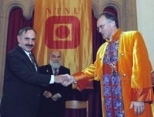Professor of Biology Robert A. Weinberg received the Albert Einstein World Award of Science at a ceremony at the Norwegian University of Science and Technology in Trondheim, Norway on November 11. The award from the World Cultural Council recognized his "valuable and pioneering contributions in the field of biomedical sciences" and his work on the genetic and molecular basis of neoplastic disease.
Professor Weinberg discovered the first human cancer-causing gene, the ras oncogene, and the first known tumor suppressor gene, Rb, the retinoblastoma gene.
Anita Goel, an MD/PhD candidate in the Harvard-MIT Division of Health Sciences and Technology (HST), was awarded this year's Distinguished Student Award at the Seventh Foresight Conference on Molecular Nano-technology. She received the $1,500 award for her ongoing research using "optical tweezers" to probe the real-time single molecule dynamics of motor enzymes "dancing on DNA."
Ms. Goel's research is at an emerging interface of physics, biology and nanotechnology. She is applying laser manipulation techniques (optical tweezers) to stretch out DNA, and is also developing a probe to directly observe the dynamics of enzymes reading a DNA molecule.
Wolfgang Ketterle, the John D. MacArthur Professor of Physics, is a co-recipient of the Franklin Institute's 2000 Benjamin Franklin Award in Physics, along with Professor Carl Wieman (SB 1973) and Professor Eric Cornell (PhD 1990), both from the University of Colorado. The award is "for their epoch-making experimental confirmation of the existence of Bose-Einstein condensation in dilute alkali vapors, and for their studies of the properties of a gas in the degenerate quantum regime."
Professor Ketterle was one of the first scientists to observe the phenomenon of Bose-Einstein condensation in dilute atomic gases in 1995. In 1997 he created the first atom laser, a device that generates an intense coherent beam of atoms which might replace conventional atomic beams where ultimate precision is required such as for atomic clocks and for tests of the fundamental laws of physics.
A version of this article appeared in MIT Tech Talk on November 17, 1999.






